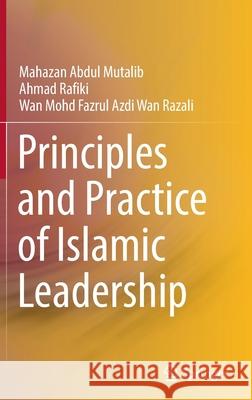Principles and Practice of Islamic Leadership » książka
topmenu



Principles and Practice of Islamic Leadership
ISBN-13: 9789811909078 / Angielski / Twarda / 2022 / 158 str.
Principles and Practice of Islamic Leadership
ISBN-13: 9789811909078 / Angielski / Twarda / 2022 / 158 str.
cena 441,75
(netto: 420,71 VAT: 5%)
Najniższa cena z 30 dni: 424,07
(netto: 420,71 VAT: 5%)
Najniższa cena z 30 dni: 424,07
Termin realizacji zamówienia:
ok. 22 dni roboczych.
ok. 22 dni roboczych.
Darmowa dostawa!
Kategorie:
Kategorie BISAC:
Wydawca:
Springer
Język:
Angielski
ISBN-13:
9789811909078
Rok wydania:
2022
Ilość stron:
158
Waga:
0.40 kg
Wymiary:
23.39 x 15.6 x 1.12
Oprawa:
Twarda
Wolumenów:
01
Dodatkowe informacje:
Wydanie ilustrowane
Chapter 1 : Introduction
Overview of Islamic Leadership
Defining Islamic Leadership
The Characteristics of Islamic Leadership
Islamic Leadership roles and styles
Distinguishing between leadership in Islamic and conventional view
Chapter 2 : The Moral Based of Islamic Leadership
Iman
Islam
Taqwa
Ihsan
Fatwa
Three Emergent Themes
Ethical Leadership
Religiosity and Spirituality
The Similarities and Differences between the Concept of Islamic Leadership and Servant Leadership
General Leadership theorySynopsis Ch 3: This chapter will discuss the concept of religiosity, spirituality, servant leadership against the Islamic leadership as well as the traits of leadership in conventional perspectives.
Chapter 4 : Spirituality and Servant Leadership
Defining spirituality
Spirituality in Modern World
Spirituality in Other Religions
Chapter 5 : Qalb Leadership process
The relation of Qalb and Leadership
Leadership traits and Behaviors Association
Definition of Qalb Leadership
Maqāṣid al-Sharīсah or the Higher Objectives of Sharīсah and Qalb Leadership
Qalb Leadership Qualities and Measures
Chapter 6 : Al-Ghazali and the Four Cardinal Virtues
Wisdom
Justice
Courage
Temperance
Chapter 7 : Islamic Principles and Values in Organization
The impact of religion elements to the organization
Islamic organizational culture and leadership
Islamic work ethics and leadership
Islamic management practices and leadership
The Need for Workplace Spirituality
8. Conclusion
Mahazan Abdul Mutalib is an Associate Professor at the Faculty of Leadership and Management, Universiti Sains Islam Malaysia (USIM). He obtained his Ph.D. from College of Business, Universiti Utara Malaysia (UUM) in 2013, a Master's Degree in organizational leadership from Monash University, in 2008 and a Bachelor in Da’wah and Islamic Management from Universiti Sains Islam Malaysia (USIM), in 2005. He has published various books and articles in the field of Islamic Leadership, management, and community studies. He was the Director for Research Management and Innovation Centre (RIMC), USIM, and Deputy Dean (Academic and Research), Faculty of Leadership and Management, USIM. Currently holds the position as Director for Industrial Relation and Community Engagement Centre (PLiMJI), USIM. He is also the Team Leader for Mizan Research Centre (MRC), USIM and a Mentor for Mizan K4C Hub which affiliated to Knowledge for Change (K4C) Global Consortium under the UNESCO Chair in Community-Based Research and Social Responsibility in Higher Education. His interest of research is in Islamic leadership and management, community studies, and Islamic sociology.
Ahmad Rafiki is an Assistant Professor and as the Dean of Faculty of Economics and Business, Universitas Medan Area (UMA). He was with University College of Bahrain in the Department of Business Administration as Assistant Professor and as Research Associate in the Mizan Research Centre, Faculty of Leadership and Management, Universiti Sains lslam Malaysia (USIM). He obtained his BBA degree with a major of Marketing from MARA University of Technology and Masters in Management from International Islamic University of Malaysia. In March 2014, he awarded Doctor of Philosophy from Universiti Sains Islam Malaysia (USIM). He is holding Certified Islamic Marketing Associate (CIMA) from the International Islamic Marketing Association (IIMA). He has published many chapters of books/authored books and articles related to Islamic management, entrepreneurship, SMEs, leadership and halal industry by International publishers such as IBA-MacMillan, IGI Global, Emerald Publishing, Springer, Routledge etc. He also became the editorial advisory board and reviewer in reputable publishers of Emerald and Elsevier. He won as the Outstanding Reviewer of Literati Awards 2020 by Emerald Publishing.
Wan Mohd Fazrul Azdi bin Wan Razali, Ph.D is a Senior Lecturer in Comparative Religion and Uṣūl al-Dīn at the Akidah and Religion Studies Program, Universiti Sains Islam Malaysia (USIM). He was the Head of Akidah and Religion Studies Program, Faculty of Leadership and Management (2009-2013), Deputy Dean (Academic and International), Faculty of Leadership and Management (2017-2019) and the Director of the Centre for Core Studies (2020-2021). Currently, he is the Deputy Dean (Academic and International), Faculty of Leadership and Management. He lectures on various key areas in Comparative Religion, Islamic Faith, Islamic Sects, Islamic Thought and Sufism. Among his publications is The Modern Study of Religion: A Preliminary Survey on Clifford Geertz (2009), Akidah Ahl Al-Sunnah Wa Al-Jamaah in Malaysia: Contemporary Challenges and Issues (2012) and Islamic Ethics & Sufism (2014). He has also published many academic papers on issues in Religious Studies and Islamic Thought. He was a Visiting Researcher at The Centre for Muslim-Christian Studies, Oxford (CMCS, Oxford) in 2015; and Research Fellow at The Centre of Interreligious Study and Dialogue (IRSYAD), Islamic and Strategic Studies Institute (ISSI), Putrajaya (since 2017); World Fatwa Management and Research Institute (INFAD), USIM (since 2019).
This book elaborates the fundamental principles and practices of Islamic leadership and management by highlighting its underlying philosophies, key concepts, and sources. The book closely examines the relationship of Islamic leadership with spiritual leadership and how it shapes the concept of leadership. The book also compares Islamic Leadership with other related spiritual leadership concepts such as the Servant Leadership, religiosity, and other conventional leadership perspectives based on Islamic framework.
The chapters within the book delve into Islamic teachings and values from Al-Qur’an and Hadith that can be applied when governing an organization using several case studies. This insightful and thorough discussion on Islamic leadership will be useful as a reference for academic courses on leadership, and current and aspiring business leaders.
1997-2026 DolnySlask.com Agencja Internetowa
Zobacz: Księgarnia Czeska | Wydawnictwo Książkowe Klimaty | Mapa strony | Lista autorów
KrainaKsiazek.PL - Księgarnia Internetowa
KrainaKsiazek.PL - Księgarnia Internetowa









